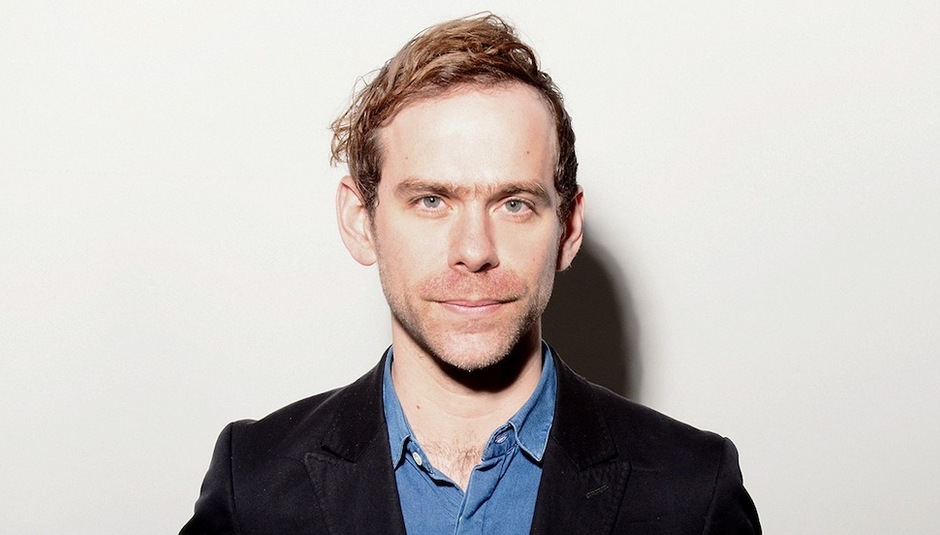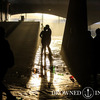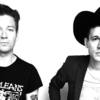You know who Bryce Dessner is: Guitarist and one of the principal songwriters in The National, he’s a borderline deity in indie circles. You probably also know by now about his credentials as a classically trained musician and, as we’ve discussed with him a couple of times here on Drowned in Sound, a composer of some repute (see here and here to refresh your memory). He is also, it turns out, one of the busiest men in modern music.
Back in mid-May, Bryce spoke to me on the phone from Paris, in the middle of recording sessions for a second album on behalf of the Red Hot Organisation, a charity that aims to fight AIDS through pop culture. It’s a follow-up to Dark was the Night, the 2009 compilation album that Bryce and his brother/bandmate Aaron produced. It’s also one of a daunting number of projects he’s currently working on.
We chatted about his several contemporary compositions, as well as his interest in quilts (more interesting that you’d expect), inventing his own instruments (exactly as brilliantly interesting as you’d expect), working with composers whose names I had to Google for spelling, his passion for American history, culture and folklore, and, because we’re good to you, there’s a little bit of news about The National album number seven.
You're currently recording out in Paris. Are you able to tell me what you're working on?
We're nearing completion on a Grateful Dead tribute that my brother and I are working on for the Red Hot organisation as a sequel to Dark was the Night, which was the big compilation we did a couple of years ago. It's a giant collaborative album; I think it's going to have over 50 tracks on it so we're working on that. Then I have concerts here this week as well with Sō Percussion.
It’s Sō Percussion who have recorded your new composition, ‘Music for Wood and Strings’. How did you come to work with them?
Sō Percussion is this amazing percussion quartet, maybe the leading one in the United States. They're very involved with contemporary music for percussion. I'd known them for a long time; when the group formed in the late 90s we were at Yale together and they went on to do really interesting things.
Recently, with Carnegie Hall, they asked me to write them a piece about three years ago. With the commission, I started to think about what would be an interesting direction for the piece and that's how I decided to come up with a new instrument for them to play, inspired by a Hammond dulcimer. So we designed these new instruments and I wrote the piece for that instrument.
I didn't realise you'd designed the instrument yourself.
There's a lot of really amazing percussion music by Steve Reich and John Cage. So I didn't really want to write a piece for standard percussion instruments – I had in mind a kind of string music, actually, that could be possibly be played by guitars but the rhythms are far too difficult and layered to be played by guitars. So I had a kind of string music played by percussionists in my head for a while actually. It was a weird situation where we had to actually invent an instrument to play this music.
The piece is played by Sō Percussion and written by me. I scored it and designed the instrument. A friend of mine built the quartet of instruments and then it's played by the percussionists.
Were you tempted to include any of your own instrumentation on the piece?
No it made sense to work it so they can play without me. They tour it a lot. The instrument's called the Chord Stick, it's an eight-string dulcimer-like instrument. So they each play that and then each one has extra percussion instruments, so there's wood blocks and snare and bass drum... it's something that really works for just the four of them.
They're going to be doing a big set at Bonnaroo on June 13th, then they'll be coming over to Ireland in September to do a small festival I'm doing there called Sounds from a Safe Harbour in Cork from September 17th to the 19th.
It's a piece that can work loud over a big PA, so at a sort of rock festival setting, but it also works really well in a small concert hall 'cause there's a lot details that come out better in a kind of listening environment.
It's quite different to the work you did last year with the Copenhagen Philharmonic Orchestra and Kronos Quartet, things like ‘St. Carolyn by the Sea’. I'm not sure this is the right way of putting it, but it feels more upbeat, there's a sense of lightness to the music. Were you looking for that big shift in sound or was it just necessitated by the commission?
The orchestra works and the string quartets have more of a European modernist influence on them, whether it's referencing string orchestra music like Bartók or Stravinsky or more contemporary things. I think there's a darkness to some of that music, whereas with this percussion piece I really wanted to try to do something more inspired by American folk music.
So the chord harmonies that the instruments are tuned to are based on folk songs, if you can imagine more like American traditional music. Then some of the harmonic ideas are something that someone like Brian Eno would use, they have a lighter tone to them. And then there's really dense rhythmic activity.
How does this relate to the Mountains and Waves event, which was a celebration of American music, that you curated at The Barbican in London in May? Sorry, my day job involves working weekends so, um, I didn’t actually get to go.
‘Music for Wood and Strings’' was one of the pieces that we featured on the Barbican weekend. The Barbican asked me to curate a festival of new American music and so a lot of the pieces that we brought together for that were inspired by American landscapes.
It's been sort of a new direction in my composition work. There's another piece called ‘Murder Ballades’ that was featured, that is actually based on American folk songs. So what you said earlier about the earlier records with the string orchestra and string quartets being different is correct, in that more recently I've been finding inspiration in folk music.
Specifically there's been a preference towards banjo patterns, which are really percussion. Steve Reich is someone who's been a big influence and very involved in my life and a lot of his music is influence by African rhythms. In a way some of this music I've been doing has taken a similar inspiration but from American music. So it's looking at some of the internal rhythms you hear in traditional music and using them in a different way.
Is the Planetarium Barbican show you did a couple of years ago with Sufjan Stevens and Nico Muhly going to get a release?
Yeah we've actually nearly finished recording that. So that will come out sometime in the not too distant future.
You played the Barbican last year as well when you were doing ‘St. Carolyn by the Sea’. Do you prefer those more low-key, intimate venues to the bigger ones you play when you're working with The National?
I really like having both sides of that experience. I think it's important to stay connected to more intimate connections with the audience. There's a big difference between playing to 200 people versus playing to 20,000!
Playing in the band is interesting because we do play big, giant concerts now, but I'm on stage with basically my family. With my brother it's my actual family and then I've been in bands with Bryan Devendorf since we were 13, so despite the fact that we're playing these massive venues there's something incredibly familiar and intimate about it for us. The chemistry that we have on stage with each other is something I wouldn't trade for anything.
The stuff I do more on my own with orchestras and with some of these contemporary music ensembles is often done in more intimate venues, which I love. I love the challenge of that and making music that can be more ambitious instrumentally. And also it's very challenging for me as a guitar player, so that's fun to do. There's a sense of adventure in contemporary music and that's why I'm drawn to it.
It's interesting that you say the classical guitar pieces are more difficult to play, as you started off as a playing classical music and becoming a classically trained musician was your first real involvement in music. Does that not come more naturally to you?
By “difficult” I mean technically. You're right, my first concerts as a professional musician were playing Bach on the guitar and that is technically very difficult! It's a different kind of practice and a different kind of energy that you need. You need a lot of focus, whereas there's a lot of adrenaline and improvisation in playing in a rock band. In classical music it requires a lot of attention and focus on the score. Also often the counting can be difficult, following the rhythms and the changing metre and things like that can be far more difficult.
I also wanted to ask about ‘Quilting’, which the Los Angeles Philharmonic Orchestra are going to be premièred recently. Apparently that's inspired by your interest in textile art; how did that interest develop?
This another piece I was commissioned to write, by the Los Angeles Philharmonic. They asked me to write a piece for a festival of American music they're having this spring. I was thinking a lot about being, in the 21st century, a young American composer writing for orchestra.
As I was writing the score I started to think about the score itself having a kind of quilt-like pattern to it. If you look at a large orchestra score there's so much geometry to it. In a way, the idea of 'Quilting' is simultaneously thinking about the score and the manuscript as a quilted pattern, but then it's also kind of a wink of the eye towards the American tradition of quilting.
If you think about the history of America around the late 19th-century, at height of European art, and you look at the things that orchestras still play – the Beethoven, the Mahler – that's probably 90 per cent of what's still heard. So it's “what would it mean to be an American writing orchestra music?”
We have a strong tradition of American composers, especially now with people like John Adams, who is a real master of orchestra music. But still I would talk with my friends and they'd say “Oh you're writing orchestra music? Why?” It's not seen as something people do. So this is looking at what Americans were doing in the 19th century and what were our forms that we really knew?
The art and the craft on quilting was very much tied to the mid-west and the American frontier experience. The patterns themselves had names that were related to narratives, so it's a very interesting tradition in that way.
Presumably, what with this piece being written for a philharmonic orchestra, the instrumentation alone means it's going to sound very different to ‘Music for Wood and Strings’, but thematically it seems linked to both that and Mountains and Waves?
Yeah you're right. ['Quilting'] is very much following ‘St. Carolyn by the Sea’: I would say that it's the closest thing that I've written to it. But then it does have, in terms of subject matter, something in common with ‘Music for Wood and Strings’, being inspired in some way by American folklore.
We've mentioned 'St. Carolyn by the Sea' a couple of times, which was a collaboration with André de Ridder and Jonny Greenwood. Are there any plans to work with them again?
André de Ridder is someone I work with a lot. He's a really amazing German conductor who lives in Berlin and he's a leading orchestra conductor for a lot of this music we're talking about, so we have several projects in the works.
With Jonny, that wasn't a direct collaboration. We included some of his work and some of my work. Although I was recently in Poland with him, where he had a premier and I did too, so he's someone I respect tremendously and I think he's an incredibly interesting composer.
I remember in an interview you did last year with Drowned in Sound you said that you'd one day like to work on a film score. Is that still an ambition for you?
The thing that's come up recently is that I'm working on something for the New York City Ballet with a choreographer named Justin Peck in collaboration with a really interesting visual artist called Marcel Dzama.
In terms of working on a film, the challenge there is finding a director. I get asked pretty frequently to work on films, but I've been avoiding it a little bit until it feels like a project where there's a sort of mutual respect with a director with a really interest in the music and featuring it, as opposed to just being in service of the narrative of the film.
It sounds like you've got a lot of projects lined up. Are the classical music and the solo compositions something that you're working on for the foreseeable future?
It's always very much been a focus for me, really since I was out of school. From my early 20s I've always been writing tons of music and getting involved in contemporary music. It's something I dalliance with when the band gets busy.
The band has started writing actually, we're writing songs for the next record. Everyone has things going on on their own so we're going to take our time and really make it as good a record as we can.
It was a huge tour you did for Trouble Will Find Me – I think I saw you four times in a couple of years on it – so did you want to take a break from The National?
We always take a break after each record. I think it's important to refresh the ideas and just go back to our lives, whatever they are. The road can be so taxing and it becomes its own kind of way of life, then you start to write songs about the road, which is not interesting! So we always try to escape the band for a while and go back to our own lives, yeah.
Should we expect to hear more of your classical influences the next time you work with the band, or do you try and keep the two things completely separate? I thought that the final section of ‘Music for Wood and Strings’ sounded a bit like the ending to ‘Terrible Love’...
Yeah maybe! I'm the same musician, whatever I'm doing, but I do think that part of what makes The National strong is that it's its own sound. I don't try to bring every influence into every piece: when I'm writing a piece for orchestra it doesn't need to sound like a National song and when I'm writing a National song it should be its own thing. I think musicians can go wrong trying to channel everything into one project.
The other thing is that The National is really the collaboration of five people, so it's all of our voices. We always say that no matter how interesting a piece of music is, if it's not a good song then it's not a good song! It's happened before where we may write a piece of music that's incredibly interesting, but if it doesn't turn into a good song then that sound shouldn't on the record. So it's a different set of criteria.
Music for Wood and Strings is out now.























